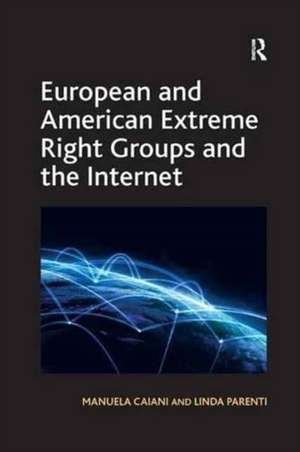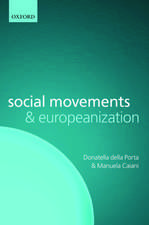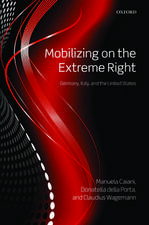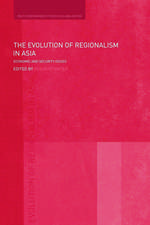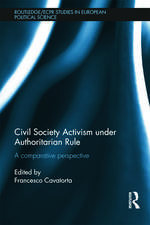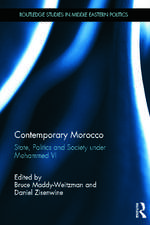European and American Extreme Right Groups and the Internet
Autor Manuela Caiani, Linda Parentien Limba Engleză Paperback – 23 noi 2016
| Toate formatele și edițiile | Preț | Express |
|---|---|---|
| Paperback (1) | 469.34 lei 6-8 săpt. | |
| Taylor & Francis – 23 noi 2016 | 469.34 lei 6-8 săpt. | |
| Hardback (1) | 1060.32 lei 6-8 săpt. | |
| Taylor & Francis – 21 mar 2013 | 1060.32 lei 6-8 săpt. |
Preț: 469.34 lei
Nou
Puncte Express: 704
Preț estimativ în valută:
89.81€ • 94.20$ • 74.76£
89.81€ • 94.20$ • 74.76£
Carte tipărită la comandă
Livrare economică 01-15 aprilie
Preluare comenzi: 021 569.72.76
Specificații
ISBN-13: 9781138260917
ISBN-10: 1138260916
Pagini: 256
Dimensiuni: 156 x 234 x 23 mm
Greutate: 0.45 kg
Ediția:1
Editura: Taylor & Francis
Colecția Routledge
Locul publicării:Oxford, United Kingdom
ISBN-10: 1138260916
Pagini: 256
Dimensiuni: 156 x 234 x 23 mm
Greutate: 0.45 kg
Ediția:1
Editura: Taylor & Francis
Colecția Routledge
Locul publicării:Oxford, United Kingdom
Notă biografică
Caiani Manuela is Assistant Professor at the IHS (Institute for Advanced studies) of Wien and Marie Curie Fellow at the URCJ (University Rey Juan Carlos) of Madrid. Linda Parenti obtained her PhD at the University of Florence in political Science and is currently research assistant (’stipendiat’) at the IHS of Wien.
Recenzii
’Social movement studies have rarely addressed right-wing extremism and, conversely, research on the radical right has rarely located it within a social movement perspective. With its systematic cross-country comparison and focus on networks, this volume constitutes a very valuable exception. Theoretically innovative and empirically sound it demonstrates how much there is to gain by bridging insights from the two fields.’ Donatella della Porta, European University Institute, Italy ’A lot has been said and written about the galaxy of extreme right groups in Western democracies, and their relation to the Internet. Caiani and Parenti shift the conversation from anecdote and speculation to systematic empirical analysis. Drawing upon dominant paradigms in social movement research, and carefully exploring both online networks and offline activism, the authors have produced a text that will appeal not only to those focusing on the extreme right, but to all those interested in the relationship between militancy and communication technology at large.’ Mario Diani, Universitat Pompeu Fabra Barcelona, Spain, and University of Trento, Italy ’This book is a major contribution to the study of right-wing political parties and movements and their use of modern technologies. Scholars of political science in general, and in the field of Computer-Mediated Communication and Information Communication Technologies studies will find an intriguing analysis of the relation between political organizations and the Internet. The well written, original and thought provoking volume sets a high standard for the analysis of the interplay between online and offline reality.’ Johannes Pollak, Institute for Political Science & Webster University Vienna, Austria ’Practitioners and scholars have highlighted the threat posed by political extremists using the Internet to further their objectives. These conclusions are mostly based upon speculation. Conversely, this fascinati
Cuprins
Chapter 1 Extreme Right Organizations and the Internet; Chapter 2 ‘Technological’, Political and Cultural Opportunities for the Extreme Right in the United States and the European Countries; Chapter 3 The Organizational Structure of the (Online) Galaxy of the European and American Extreme Right; Chapter 4 Extreme Right Groups and the Internet; Chapter 5 Between Real and Virtual; Chapter 6 Conclusion;
Descriere
How do right wing extremist organizations throughout the world use the Internet as a tool for communication and recruitment? What is its role in identity-building within radical right-wing groups and how do they use the Internet to set their agenda, build contacts, spread their ideology and encourage mobilization? Manuela Caiani and Linda Parenti address and examine these questions, analysing the potential role of the Internet on the identity-building processes of right wing organizations in France, Germany, Italy, Spain, the United Kingdom and USA and how their use of the internet influences their mobilization and action strategies.
